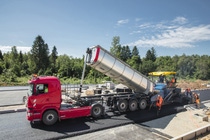Media
Bitumen additive B2Last® makes roads more durable – and road construction more sustainable
- Better performance, lower emissions
- Innovative BASF additive protects people and the environment along the whole process chain
The number of heavy vehicles on the roads is increasing and climate change causes more extreme weather conditions. Roads are subjected to even higher loads, usually requiring replacement after ten to twelve years. An innovative bitumen additive from BASF has been designed to make roads last longer. BASF has spent several years developing the additive together with the Institute of Highway Engineering in Aachen, and is now available under the name B2Last®. The product’s aim is already reflected in its name: “bitumen to last”. “We expect an extension of the average road life span by up to 50 percent,” said Dag Wiebelhaus, responsible Head of Product Innovation in the Monomers operating division.
The new additive works differently than conventional bitumen modifiers. It binds components in the bitumen to form a strong yet elastic polymer grid. This makes roads more durable and therefore truck tires do not trigger rutting as quickly during hot spells. Studies have demonstrated that the asphalt remains stable even when ambient temperatures are 10 to 15 degrees Celsius higher than usual - an essential aspect as summers become warmer. At the same time, the road surface still has enough elasticity to prevent cracking at cold temperatures. “Roads, that are replaced less frequently, not only reduce costs. Fewer road construction sites also means fewer traffic jams,” emphasized Otto Kumberger, Head of Strategy in the Monomers operating division at BASF.
The use of the new additive also enables the reduction of bitumen emissions during road construction, since asphalt mix production and laying can be carried out at 135 to 145 degrees Celsius and not at 160 or 180 degrees as otherwise usual. “Measurements from an independent laboratory show that the bitumen vapors and aerosols, to which the road construction workers are exposed, drop by up to 65 percent,” reported the project manager Michael Zeilinger. The innovative additive thus helps to already partially fulfill the new occupational exposure limit during asphalt laying. In Germany this limit was recently reduced from 10.0 to 1.5 milligrams per cubic meters.
Additionally, the new bitumen additive allows significant CO2 savings – not only because it permits less frequent repair of the roads and less energy at asphalt mix production. When B2Last is used, a large proportion of reclaimed asphalt, i.e. recycled asphalt, can be added to the asphalt mixture. This means that less new material has to be produced, normally requiring high levels of energy and resources causing CO2 emissions. Experiences gathered from various paving trials, including the construction of a test section on the A96 highway near Munich, have confirmed this. “We have seen that B2Last chemically interlinks the aged and virgin bitumen in an effective manner,” explained the project manager Michael Zeilinger. “At the same time, a high proportion of reclaimed asphalt still allows excellent homogeneity and processability of the mixture.”
On behalf of BASF, the Institute for Transport Systems and Infrastructure of the Karlsruhe University of Applied Sciences has carried out a life cycle analysis on the basis of laboratory tests and model calculations for B2Last provided by the Institute of Highway Engineering of the RWTH Aachen University. It showed that the use of B2Last can save up to 46 percent CO2 emissions and up to 37 percent primary resources. And the product can also convince in terms of economical benefits with a cost saving potential of up to 24 percent for an expected life cycle of the asphalt base layer of 60 years. Longer road life time, excellent workability of the asphalt mix, lower CO2 emissions and improved health protection: The new development promises numerous positive effects. “It is no exaggeration to say that B2Last can make road construction more sustainable,” summed up Head of Strategy Kumberger.
B2Last is available now in Europe and from July in North America, with other regions also planned to follow.
To learn more about B2last in Europe – go to www.B2Last.com and https://youtu.be/orlv0ZMYTtY; to learn more about B2Last in North America – go to https://b2lastna.basf.com.
Receive up-to-date news releases from BASF via push notification on your smartphone. Register for our news service at basf.com/pushnews.
About BASF
At BASF, we create chemistry for a sustainable future. We combine economic success with environmental protection and social responsibility. More than 117,000 employees in the BASF Group work on contributing to the success of our customers in nearly all sectors and almost every country in the world. Our portfolio is organized into six segments: Chemicals, Materials, Industrial Solutions, Surface Technologies, Nutrition & Care and Agricultural Solutions. BASF generated sales of €59 billion in 2019. BASF shares are traded on the stock exchange in Frankfurt (BAS) and as American Depositary Receipts (BASFY) in the U.S. Further information at www.basf.com.
P-20-225


